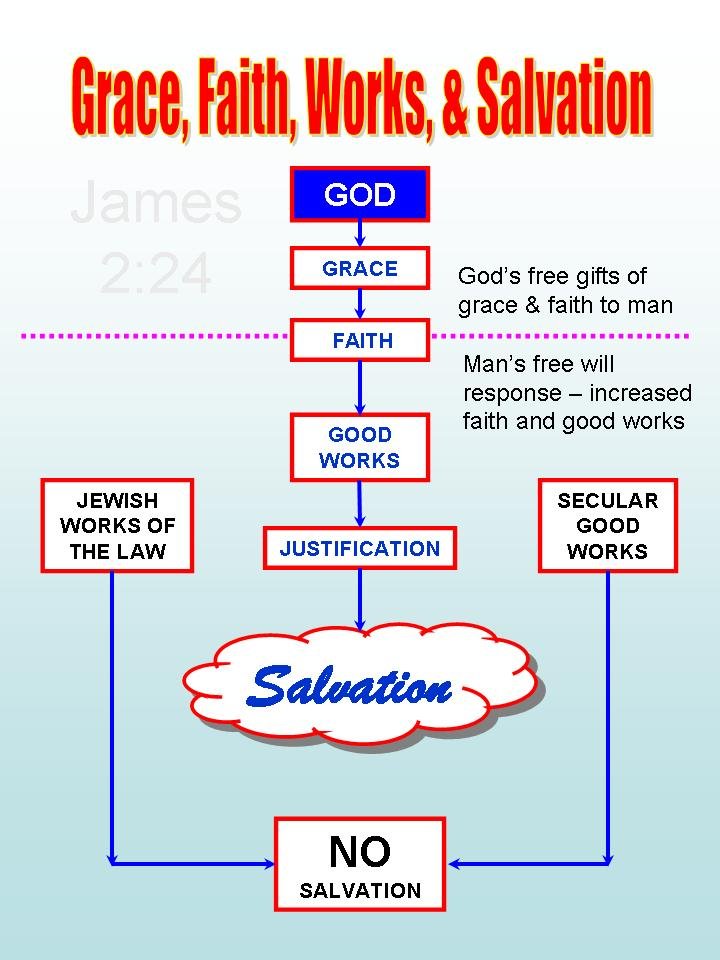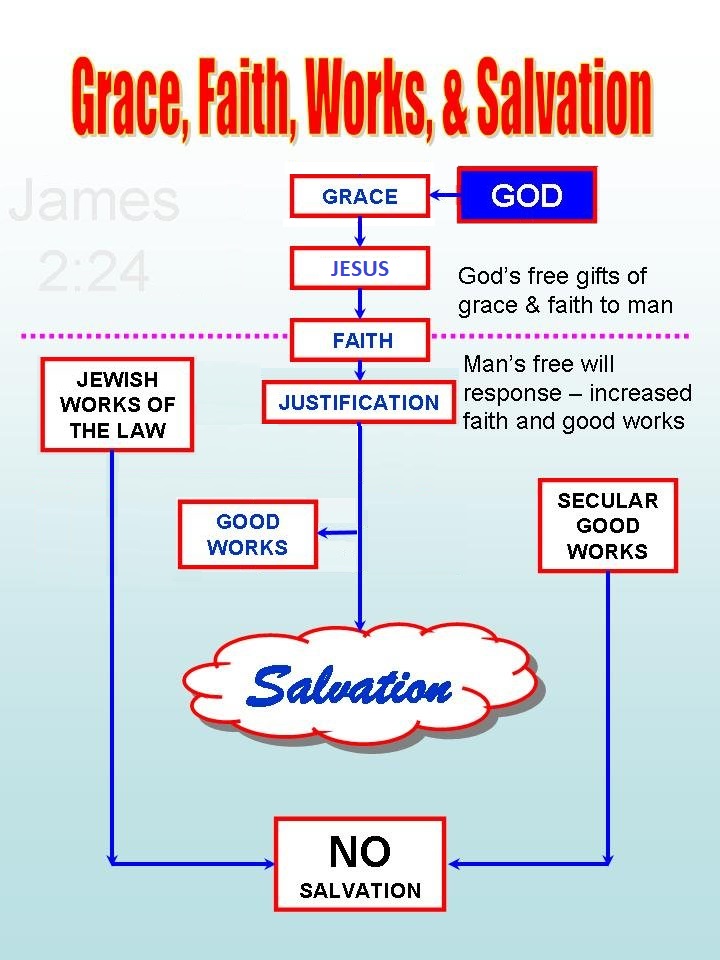
| Home | Our Hope | |
| Bible Study |

|
May 28, 2017 |
| Salvation by Works | ||
Protestant churches and the Catholic church agree about many things, life begins at conception, marriage is indissoluble, except for adultery, and others. But there are many places where they disagree and many of those are core issues, for example salvation.
Protestants accuse Catholics of believing that salvation comes by works. Catholics accuse Protestants of holding the un-Biblical belief that salvation can come without good works. Both sides usually misrepresent the other side's point of view to prove their own point of view.
In this lesson we'll look at the whole topic of salvation by works.
No Christian church says that it believes that salvation can be earned by works, by doing good things. This is because the Bible is very clear about that.
For it is by [God's] grace that we have been saved through faith, and this faith was not from you, but it is the gift of God, 9 not of works, lest anyone should boast. 10 For we are his creatures who are created in Yeshua the Messiah for good works, those things which God had from the first prepared that we should walk in them. (Ephesians 2:8-10)
How is it then that Protestants accuse Catholics of believing in salvation by works? We need to understand salvation more deeply. This lesson will focus on the following illustration which comes from a Catholic source. This illustration is so high-level though that Protestants would find very little to contradict in it. As they say, the devil is in the details.
 1
1
From the top, the diagram shows that God, by his grace, provides faith to mankind. No Protestant has a problem with that.
Then there are good works done throughout life. That's where the differences lie, both in the perspective on those works and on what the works include.
The illustration shows the result is a future justification and salvation. Some preachers preach that justification and salvation occur immediately. That isn't correct and we dealt with that in a previous lesson. Some preachers take it to the next step, saying that once salvation is achieved it can never be lost. We call that Once-Saved-Always-Saved but it goes by many other names.
The illustration also shows something about "Jewish works of the law" and "Secular good works". We'll cover that at the end.
We can't even begin to discuss good works without first understanding the difference in perspective between the Catholic Church and the Protestant Churches. The Catholic Church teaches that holiness must be maintained and good works earn value toward that. Without good works, holiness would dissipate because of the evil works we do.
The normative Protestant churches teach that holiness is only lost by sin and is restored through repentance by God's forgiveness and Jesus' atoning sacrifice. Protestant churches do not believe that good works earn anything in this life. We do them because they please God and because God has prepared them for us to do, as the Ephesians verse above says.
In fact the Catholic church believes that Jesus and the apostles did so many good works that there was earned value left over. It is from this pool that a priest dispenses when he prays someone out of Purgatory. That seems a little odd to a Protestant - that one person's good works could help another person.
Because of this difference in belief the Catholic church's perspective on good works is that they must be done. The Protestant church's belief is that good works are done because we desire to do them and that desire comes from God.
"According to the doctrine of the Roman church, [good works] are efficacious ex opere operato, i.e. in virtue of a power inherent in themselves as outward acts whereby they communicate saving benefits to those who receive them without opposing any obstacle." 2 The point here is that some works earn value that is inherent in the act.
This difference in perspective from "must" to "desire" could seem unimportant. It is, however, critical to the thinking and motivation of the believer.
Because the Catholic Church believes that good works must be done for their earned value and because no one knows the total they have earned or even what total they need to earn to achieve salvation, a Catholic cannot be sure of his salvation. Such a person must keep busy doing good works in the hope that they will be enough.
Protestants and Catholics agree that good works include personal growth, helping the poor, loving one another, and all the fruits of the Spirit, and others.
On top of this the Catholic Church adds good works that the Protestants do not consider as works at all. They have a list of 7 good works they call "Sacraments", a term that is rarely heard in the Protestant church. These they consider to be efficacious, in the sense that they earn value for the person. The list is:
One thing has to be noticed here - the imposition of the Catholic Church. Without it there can be no sacraments, none of these good works. This is the belief of the Catholic Church. Salvation is not possible without it.
Catholics commonly misunderstand the Protestant claim to "by faith only" as meaning "faith without works" and therefore contradicting the Bible.
You see that by works a man is justified and not from faith alone. (James 2:24)
Protestants do not believe in "faith without works." The Protestant churches teach works are the consequence of faith and the sign of faith.
For a man may say to you, "You and I have faith; I have works. Show me your faith without works, and I shall show you my faith by my works." (James 2:18)
Because the Catholic Church position is that salvation is not possible without the Roman Catholic Church, therefore Protestants cannot be saved and in fact are cursed.
Where is pride, therefore? It has been eliminated with him. By what law? Of works? No, but by the law of faith. 28 We determine therefore that by faith a man is made righteous and not by the works of the Law (Torah). (Romans 3:27-28)
It appears here that Paul is directly contradicting the quote from James above. He isn't. In the full context of James' message (not shown here) the point he is making is that true faith will have works. The two are inseparable. If you say you have faith but you do not have works then you do not have the faith you claim.
Paul would not have disagreed with James on this. Paul didn't mention that faith and works are inseparable because that wasn't relevant to the point he was making. His point is that works (alone) do not result in salvation. Only faith does that.
Catholics do not believe that salvation can be earned by works alone. They absolutely believe in faith and repentance as prerequisites to good works, as shown in the illustration. They believe you must do good works
Protestants doubt that salvation is possible for Catholics because their faith is not entirely in God but also in their good works. This is seen as a form of idolatry of self and of the church. The Catholic response to this is that God provided these works for us that we might earn merit. Therefore it isn't idolatry.
The Catholic Church insists that it does not believe in Salvation by Works. The evidence against them is a system where good works are measured against evil works and no one can be sure of their Salvation. That certainly is present in the Catholic Church.
The illustration shows that "Jewish works of the law" and "Secular good works" do not result in salvation. The Protestant churches agree with the intent of that message but the wording is interesting
When it says "Jewish works of the law" that is a reference to what Paul said, but Paul only said "works of the law." The addition of the word "Jewish" here has to be seen as a sign of the anti-Semitism that still exists in the Catholic Church as it does in some of the Protestant churches.
Paul means that obeying the laws of the faith by themselves cannot result in salvation. That is true whether they are the Old Testament or New Testament laws. As the diagram shows, faith is the first step and the continuing requirement.
The illustration also shows "Secular good works." You might wonder what exactly a secular good work might be. Secular good works are the same as Christian good works, feeding the hungry, helping the poor, etc. The illustration is trying to say that good works do not result in salvation unless they are coupled with faith.

How is it possible that this illustration can be interpreted so differently by different groups? The answer is that the illustration is incomplete to the point of being incorrect.
The box labelled "Faith" is the problem. Faith is not abstract; it is directed toward something. In our case it is Faith in Jesus as our savior. So God provides both Jesus and faith. Jesus died as an atonement (payment) for our sins, all our sins. That atonement is missing from the illustration.
The Catholic Church's view treats Jesus' sacrifice as though it wasn't sufficient and therefore it is necessary for each person to work to maintain that gift. As soon as the all-sufficient atonement is considered, penance is gone. With it disappears Purgatory and the entire system of weighing good versus evil. That balance scale is destroyed when all evil is already paid for and therefore good works have no value.
That brings us to the answer to the question. Who is correct? The normative Protestant view is correct. There is no system for weighing good works versus evil works. Every debt that needs to be paid has been paid.
When we wonder how the Roman Catholic Church came to this view, it isn't hard to imagine a reason. We've seen how all the Sacraments are under the control of the church. This is true of other aspects of Catholicism as well.
When Jesus died on the cross, the curtain into the Holy of Holies was torn in two, signifying that direct access to God was now possible through Jesus. That brought an end to the priesthood that acted as an intercessor between God and man.
The Catholic Church's beliefs and the powers it arrogated to itself show it to be an attempt to insert itself as a new priesthood back in to that position of intercessor between man and God
1 http://www.catholicbible101.com/whatisgrace.htm
2 http://www.biblestudytools.com/dictionary/sacraments/